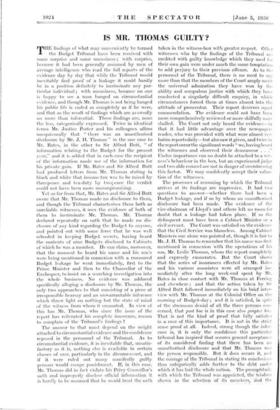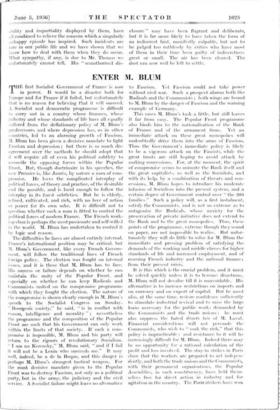IS MR. THOMAS GUILTY?
THE findings of what may conveniently be termed the Budget Tribunal have been received with some surprise and some uneasiness ; with surprise, because it had been generally ass-timed by men of average intelligence who read the full reports of the evidence day by day that while the Tribunal ,would inevitably find proof of a leakage it could hardly be in a position definitely to incriminate any par- ticular individual ; with uneasiness, because no one is happy to sec a man hanged on circumstantial evidence, and though Mr. Thomas is not being hanged his public life is ended as completely as if he were, and that as the result of findings which are avowedly no more than inferential. Those findings are, none the less, categorically expressed. Twice in identical terms Mr. Justice Porter and his colleagues affirm unequivocally that "there was an unauthorised disclosure by Mr. J. II. Thomas" in the one case to Mr. Bates, in the other to Sir Alfred Butt, "of information relating to the Budget for the present year," and it is added that in each case the recipient of the information made use of the information for his private gain. If Mr. Bates and Sir Alfred Butt had produced letters from Mr. Thomas stating in black and white that income-tax was to be raised by threepence and tea-duty by twopence the verdict could not have been more uncompromising.
Yet so far from that, Mr. Bates and Sir Alfred Butt swore that Mr. Thomas made no disclosure to them, and though the Tribunal characterises them both as unreliable witnesses, it uses the evidence of both of them to incriminate Mr. Thomas. Mr. Thomas declared repeatedly on oath that he made no dis- closure of any kind regarding the Budget to anyone, and pointed out with some force that he was well schooled in keeping Budget secrets, having heard the contents of nine Budgets disclosed to Cabinets of which he was a member. lie can claim, moreover, that the moment he heard his name and his son's were being mentioned in connexion with a rumoured Budget leakage he went immediately, first to the Prime Minister and then to the Chancellor of the Exchequer, to insist on a searching investigation into the whole business. No evidence was , adduced specifically alleging a disclosure by Mr. Thomas, the only two approaches to that consisting of a piece of irresponsible hearsay and an unwarrantable inference which threw light on nothing but the state of mind of the witness from whom it emanated. In view of this has Mr. •Thomas, who since the issue of the report has reiterated his complete innocence, reason to complain of the Tribunal's findings ?
The answer to that must depend on the weight attached to circumstantial evidence. and the confidence reposed in the personnel ,of the Tribunal. As to . circumstantial, evidence, it is inevitable that, unsatis- factory as it is, nothing else is available in certain classes of ease, particularly in the divorce-court, and if it were ruled out many manifestly guilty persons would escape punishment. If, in this case, Mr. Thomas did in fact violate his Privy Councillor's oath and improperly disclose official information it is hardly to be assumed, that he wculd .treat the oath taken in the witness-box with greater respect. Other witnesses who by the findings of the Tribunal are credited with guilty knowledge which they Used for their own gain were under much the same temptation to add perjury to their previous offence. As to the personnel a the Tribunal, there is no need to say more than that the members of the Court amply merit the universal admiration they have won - by the ability and scrupulous justice with which they have conducted . a singularly difficult enquiry, in. Nyllielt circumstances forced them at times almost into the attitude of prosecutor. Their report deserves equal commendation. The evidence could not have been more comprehensively reviewed or more skilfully mar- shalled. The Court- not only heard the evidence—in that it had little advantage over the newspaper. reader, who was provided with what were almost ver- batim reports daily—but also saw it given, and twice in the report occur the significant words "we, having heard the witnesses and observed their demeanour. . . ." Undue importance can no doubt be attached to a wit- ness's behaviour in the box, but an experienced judge and two able counsel are not in danger of overstressing this factor. We may confidently accept their valua- tion of the witnesses.
The processes of reasoning by which the Tribunal arrives at its findings are impressive. It had two questions to answer—whether there had been a Budget leakage, and if so by whom an unauthorised disclosure had been made. The evidence of the vice-chairman of Lloyd's and others left no room for doubt that a leakage had taken place. If so the delinquent must have been a Cabinet Minister or a civil servant. The Court was satisfied on the evidence that the Civil Service was blameless. Among Cabinet Ministers one alone was pointed at, though it is fair to Mr. J. H. Thomas to remember that his name was first mentioned in connexion with the operations of his son, Mr. Leslie Thomas, whom the report coMpletely and expressly exonerates. But the Court shows that the series of insurances effected by Mr. Bates and his various associates were all arranged im- mediately after the long week-end spent by Mr. Bates in close contact with Mr. Thomas at Perring and elsewhere ; and that the action taken by Sir Alfred Butt followed immediately on his brief inter- view with Mr. Thomas at the Colonial Office- on the morning of Budget-day ; and it is satisfied, in spite of the strenuous denial of all the three persons con- cerned, that post hoc is in this ease. also proptei hoe. That is not the kind of proof that fully satisfies in a case of this importance. It is not in the strict sense proof at all. Indeed, strong though the infer- ence is, it is only the confidence this particular tribunal has inspired that secures general acceptance of its considered finding that there has been an unauthorised disclosure and that Mr. Thomas was the person resPonsible. But it' does secure it, and the courage of the Tribunal in stating its conelusions thus categorically- adds further to the . debt. under which it has laid the 'whole nation. The proniptitudc with which the Tribunal' was appointed,. the .viscliam shown in the selection of its members,,' and the ability and impartiality displayed by them, have all combined to relieve the concern which a singularly. unhappy episode has inspired. Such incidents are rare in our public life and we have shown that we know how to deal with them when they do occur. What sympathy, if any, is due to Mr. Thomas we unfortunately cannot tell. His "unauthorised dis- closure " may have been flagrant and deliberate, but it is far 1-uore likely to have taken the form of an indiscreet hint, manifestly culpable, but not to be judged too ruthlessly by critics who have most of them in their time been guilty of indiscretions great or small. The air has been cleared. The dust can now well be left to settle.















































 Previous page
Previous page